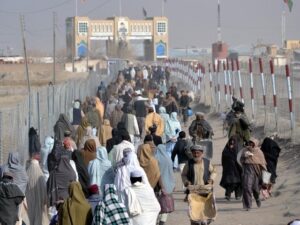by Ali Khan Bangash 12 October 2023
Afghanistan, a nation situated in a region prone to seismic activity, has once again borne the brunt of a devastating earthquake, unleashing a calamity that has left behind a landscape of desolation and human suffering. This most recent seismic event, registering at a magnitude of 6.3 on the Richter scale, centered in Western Afghanistan, with the affected areas encompassing regions within approximately 40 kilometers of Herat, a city renowned as the cultural capital of the nation. The repercussions of this natural catastrophe have been nothing short of profound, encompassing a significant loss of life, countless injuries, and extensive property damage. Afghanistan, nestled in an area characterized by tectonic restlessness, has a history marred by earthquakes, and the ensuing destruction often lays bare the country’s vulnerability. This vulnerability is exacerbated by a lack of robust infrastructure and disaster preparedness, rendering Afghanistan ill-equipped to contend with such formidable seismic challenges. It is worth noting that the earthquake in March, which struck the northeastern part of the nation, triggered landslides, resulted in casualties, and wreaked havoc on homes and communities.
Another haunting episode unfolded last June when a formidable earthquake, boasting a magnitude of 5.9, rocked Eastern Paktika and Khost, leading to the tragic loss of over a thousand lives. The legacy of these tremors is etched in sorrow and devastation. Moreover, on January 17, 2022, a 5.6 magnitude earthquake struck Badghis, a Western province neighboring Herat, further accentuating the seismic vulnerability of the region. These repeated encounters with the earth’s fury lay bare the pressing need for robust disaster management and infrastructure development in Afghanistan. The most recent earthquake, however, has emerged as an unparalleled tragedy. The affected areas, including Dasht Hows, Bahadorzai, Badghis, Farah, Zoryan, and Koshkak, have borne the full brunt of nature’s wrath. The toll on human life has been staggering, with approximately 2,400 individuals succumbing to the forces of the quake, and thousands more left grappling with injuries. The scale of destruction is heart-wrenching, with countless homes reduced to rubble, leaving hundreds of families homeless and thousands displaced. The haunting imagery of debris-strewn landscapes serves as a poignant reminder of the raw power of nature.
In the face of such overwhelming devastation, the people of Afghanistan find themselves in a precarious situation. The earthquake has exposed the fragility of the nation’s healthcare system, where the shortage of medical personnel and basic medication compounds the challenges of providing adequate healthcare to the earthquake-affected individuals. This crisis extends beyond the immediate aftermath of the earthquake, as the paucity of healthcare resources casts a long shadow over the lives of ordinary Afghans. The role of the Taliban in this scenario adds another layer of complexity to an already dire situation. The Taliban’s control over Afghanistan has not been met with widespread comfort among the Afghan populace. The brain drain that ensued with the Taliban’s takeover of Kabul is a testament to the uncertainty that has clouded the country’s future. However, the current crisis has placed the spotlight on the healthcare system’s dire state, with glaring inadequacies in medical staff and essential medication. The earthquake has underscored the urgent need for healthcare reform and the establishment of a resilient and efficient healthcare infrastructure.
On the international stage, the role of the United States has been met with scrutiny and criticism. The Doha deal, which was signed with the Taliban, has been viewed as a betrayal of the previous Afghan government. This deal, combined with the freezing of Afghanistan’s foreign reserves, totaling 7 billion USD, raises questions about the ethical dimensions of the international response to the crisis. At a time when Afghanistan is reeling from a severe humanitarian catastrophe, the freezing of foreign reserves appears to be a stark contradiction to the principles of humanitarian aid. The world’s response, with specific reference to international organizations like the World Health Organization (WHO), the United Nations Children’s Fund (UNICEF), and the United Nations Educational, Scientific, and Cultural Organization (UNESCO), has come under criticism for its perceived inadequacy. The earthquake has left a trail of devastation in its wake, and the response from these organizations, including the Taliban, has left the earthquake victims at the mercy of their circumstances. This situation is a stark reminder of the urgent need for a coordinated and robust humanitarian response to address the dire needs of the Afghan people.
In conclusion, the current scenario in Afghanistan, where a devastating earthquake has shaken the lives of countless Afghans, calls for immediate attention, empathy, and action. The situation is a complex web of natural disasters, political dynamics, and humanitarian crises. The people of Afghanistan are enduring the consequences of decisions made on both national and international fronts. The role of the Taliban, the United States, and international organizations like the UNO is currently facing scrutiny, criticism, and condemnation. The Afghan people, who have borne the brunt of circumstances beyond their control, deserve more than a mere spectacle of hypocritical policies and inadequate responses. The situation calls for a reevaluation of priorities, a recommitment to human values, and a genuine effort to mitigate the suffering of those affected by the earthquake. Post-earthquake development activities in Afghanistan are not just a necessity; they are an obligation that the international community must acknowledge and fulfill. The people of Afghanistan have long been caught in the crossfire of political turmoil and natural disasters that they did not create. It is time for sanity to prevail, for humanitarian principles to guide action, and for a collective effort to rebuild the lives of those who have endured so much. The world must not turn a blind eye to this dire situation, and the Afghan people must not be left to fend for themselves in the face of adversity.

